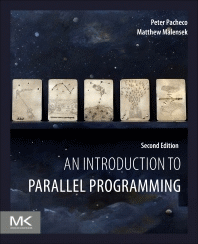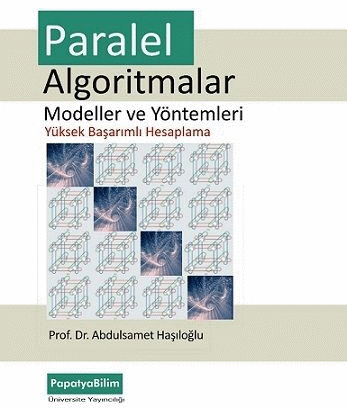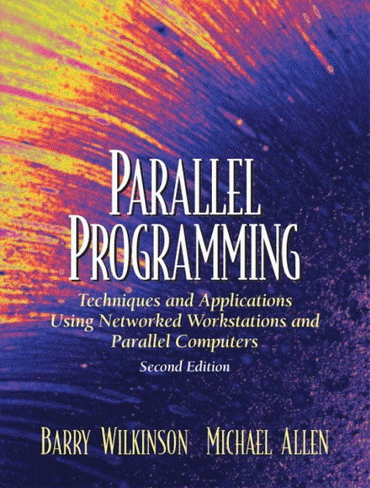IKC-MH.57
Introduction to High Performance and Parallel
Computing
2022-2023
Spring
Most
recent announcement: June20
TIME
|
MONDAY
|
TUESDAY
|
WEDNESDAY
|
THURSDAY
|
FRIDAY
|
|
8:30
|
|
|
|
|
|
|
|
9:30
|
|
|
|
|
|
|
|
|
10:30
|
|
|
|
|
|
|
|
|
11:30
|
|
|
|
|
|
|
|
12:30
|
|
|
|
|
|
|
|
13:30
|
|
|
|
|
|
|
|
14:00
|
|
|
|
|
|
|
|
15:00
|
|
|
|
|
|
|
|
16:00
|
|
|
|
|
IKC-MH.57
|
|
|
17:00
|
|
|
|
|
IKC-MH.57
|
|
|
Instructor
Cem
Özdoğan
office:
Faculty of Engineering and Architecture
Department of
Engineering Sciences, H1-33
office
hours: Schedule
or appointment by email, or drop by
anytime
office phone: 329
3535 / 3803
email address:
cem.ozdogan@ikc.edu.tr
cozdogan11@gmail.com
|
TA
Not Available
office:
office hours:
office phone:
email address:
|
Announcements
Watch this space for the latest updates (If the
characters do not show properly, please try viewing this page with
Unicode (UTF-8) encoding). Last updated:
Tue, June 20, 2023
Final
Examination
grades are available, see Course
Schedule section
Thu, June 1, 2023
Final
Examination
will be as take-home work, see Course
Schedule section
Thu, June 1, 2023
Midtem
Examination grades are available, see Course
Schedule section
Wed, May 24, 2023
Lecture
notes for week12
is
published, see Course
Schedule section
Wed, May 10, 2023
Lecture
notes for week11
is
published, see Course
Schedule section
Sun, April 30, 2023
Lecture
notes for week10
is
published, see Course
Schedule section
Wed, April 12, 2023
Lecture
notes for week9
is
published, see Course
Schedule section
Wed, April 12, 2023
Lecture
notes for week8
is
published, see Course
Schedule section
Wed, April 12, 2023
No
lecture at week7. Midtem Examination will be as take-home work,
see Course
Schedule section
Fri, March 31, 2023
Lecture
notes for week6
is
published, see Course
Schedule section
Thu, March 23, 2023
Lecture
notes for week5
is
published, see Course
Schedule section
Thu, March 16, 2023
Lecture
notes for week4
is
published, see Course
Schedule section
Wed, March 8, 2023
Lecture
notes for week3 is published, see Course
Schedule section
Thu, March 2, 2023
Lecture
notes for week2
is
published, see Course
Schedule section
Thu, February 23, 2023
In the first lecture,
there will be first meeting. The lecture notes will be published
soon, see Course
Schedule section.
Back to top
Lecture Information
Almost
all computer systems today are multi-core processors systems.
Parallel programming must be used to take benefit
of
the full performance of such systems. Parallel programming also
describes the processes and instructions for dividing a larger
problem into smaller steps. The instructions are passed to multiple
processors for
required
calculations
to be executed in parallel. A practical approach to parallel program
design and development will be presented in the course content.
Awareness of potential design and performance concepts in
heterogeneous computer architectures will be gained. Important
announcements will be posted to the
Announcements
section
of this web page,
so please check this page frequently. You are responsible for all
such announcements, as well as announcements made in lecture.
Back to top
Course Overview
IKC-MH.57
is
intended to provide students an
introduction to parallel programming by using C and/or similar
programming languages. In this course, the basics of high performance
and parallel computing will be given. OpenMP (Open Multi-Processing)
in multi-core systems and MPI (Message Passing Interface) message
passing in distributed memory systems will be taught for parallel
programming. MPI is the industry standardized parallelization
paradigm in high-performance computing and enables programs to be
written that run on distributed memory machines. OpenMP is a
thread-based approach to parallelize a program over a single shared
memory machine. An introduction to the basic concepts of hybrid and
accelerated paradigms as Cuda OpenCL programming will be given. The
course consists of theoretical topics and hands-on practical
exercises on parallel programming.
Upon
completion of this course the students will be able to
understand/explain/apply;
Learn
how to work in a scientific computing environment.
Gain
awareness of Parallel and High Performance Computing concepts for
systems with shared/distributed memory.
Can
write parallel programs both for systems with shared memory using
threading (OpenMP ) and systems with distributed memory using
message passing
(MPI).
May
define the MPI message passing
standard’s
control of communication between processes, subroutines, or
functions within the program.
Gains
basic knowledge of Cuda OpenCL hybrid and accelerated paradigms.
Gains
the ability and understanding to develop parallel programs to solve
a given big numerical/engineering/scientific problem.
Back to top
Text Book
Lecture
material will be based on them. It is strongly advised
that
student should read textbooks rather than only content with the
lecture material supplied from the lecturer.
Required
|
Recommended
|
|
An
Introduction to Parallel Programming
by
Peter Pacheco and Matthew Malensek, Morgan Kaufmann,
2nd
edition, 2021
Elsevier
|
Paralel
Algoritmalar: Modeller ve Yöntemler (Yüksek Başarımlı
Hesaplama)
by
Abdulsamet Haşıloğlu 2020
Papatya
Bilim
|
Parallel
Programming: Techniques and Application Using Networked
Workstations and Parallel Computers
by
Barry Wilkinson and Michael
Allen
2nd edition, 2005
Pearson
|

|

|

|
Back to top
Online Resourcess
The following resources are available online. Please
inform me about the usefullness of the materials. Check this place
for updates.
Back to top
Grading Criteria
Midterms & Final Exams:
There will be one midterm and one final exam, will count 30% each
and 40% of your grade, respectively.
Homeworks/Assignments (or
Term Project):
30%.
Back to top
Policies
You can use
ideas from the literature (with proper citation).
You can use
anything from the textbook/notes.
Exams: 1
page of notes (double sides) is allowed.
I encourage
you to ask questions in class. You are supposed to ask questions.
Don't guess, ask a question!
Back to top
Tentative Course Outline
Back to top
Tentative
Course
Schedule &
Lecture Notes
The following schedule is tentative; it may be
updated later in the semester, so check back here frequently.
Week
|
Topic
|
Lecture Notes
|
Quizes
|
Homeworks
|
Pdf
|
html
|
Pdf
|
Pdf
|
Grades
|
Grades
|
Lectures
|
1
|
First Meeting
Lecture
Information. Installation of Linux system and required
tools/programs using VirtualBox in Windows environment
(kubuntu-22.04.3-desktop-amd64.iso
& VboxGuestAdditions_6.1.38.iso)
|
pdf
|
html
|
NA
|
2
|
Introduction
I
Four
Decades of Computing. Parallel Computers. Computing
Clusters,
Flynn’s Taxonomy of Computer Architecture
|
pdf
|
Hands-On
|
NA
|
3
|
Introduction
II
SIMD
Architecture, MIMD Architecture. Shared Memory Organization.
Message Passing Organization
|
pdf
|
Hands-On
|
NA
|
4
|
Performance
Analysis
Computational
Models. Skeptic Postulates For Parallel Architectures. Amdahl's
Law
|
pdf
|
Hands-On
|
NA
|
5
|
Programming
Using the Message-Passing Paradigm I
Principles
of Message-Passing Programming. Structure of Message-Passing
Programs. The Building Blocks: Send and Receive Operations
|
pdf
|
Hands-On
|
NA
|
6
|
Programming
Using the Message-Passing Paradigm II
MPI:
the Message Passing Interface. Starting and Terminating the MPI
Library. Communicators and communication in MPI. Getting
Information. Sending and Receiving Messages. Avoiding Deadlocks.
Sending and Receiving Messages Simultaneously
|
pdf
|
Hands-On
|
NA
|
8
|
Programming
Using the Message-Passing Paradigm III
Parallelization
Application Example - Pi Computation
|
pdf
|
|
NA
|
9
|
Programming
Using the Message-Passing Paradigm IV
MPI:
Message Passing Interface. Overlapping Communication with
Computation. Collective Communication and Computation Operations.
Broadcast, Reduction, Gather, Scatter, All-to-All
|
pdf
|
Hands-On
|
NA
|
10
|
Programming
Using the Shared Memory Paradigm I
What
is a Thread? Threads Model. Why Threads? Thread Basics: Creation
and Termination, Passing Arguments, Joining
|
pdf
|
Hands-On
|
NA
|
11
|
Programming
Using the Shared Memory Paradigm II
Getting
started with OpenMP: a Standard for Directive Based Parallel
Programming. Worksharing directives
|
pdf
|
Hands-On
|
NA
|
12
|
Beyond
OpenMP and MPI
GPU
parallelization. GPUs: Introduction and Architecture. Execution
and programming models. Introduction
to CUDA
|
pdf
|
Hands-On
|
NA
|
13
|
MPI
+ OpenMP
OpenMP,
MPI and Accelerators overview
|
pdf
|
html
|
NA
|
14
|
Introduction
to CUDA and OpenCL
|
pdf
|
html
|
NA
|
Exams
|
7
|
Take-home Midterm Examination
|
Solutions:
|
pdf
|
pdf
|
html
|
html
|
15
|
Take-home Final Examination
|
June 20, 2023
02:44 PM
Grades
|
pdf
|
html
|
Back to top
References (other than text books)
Back
to top


